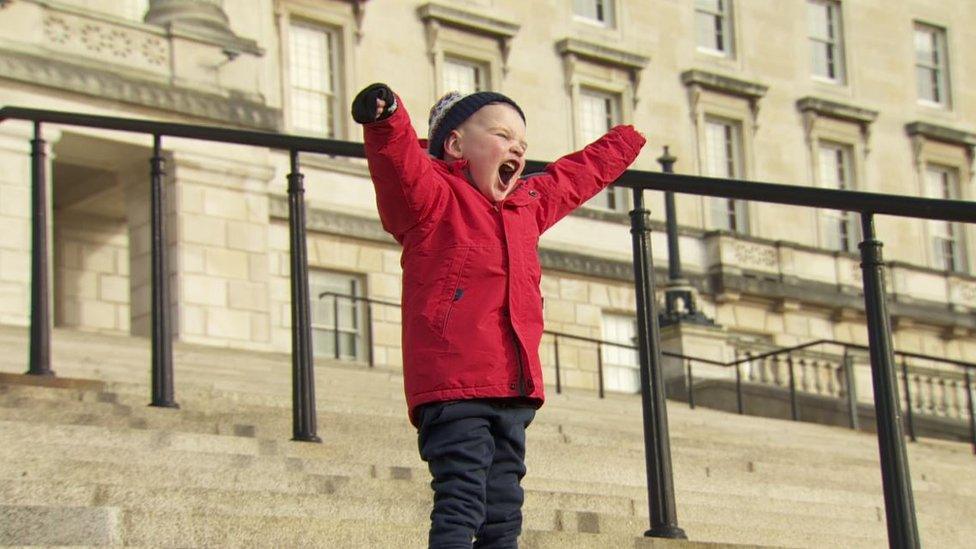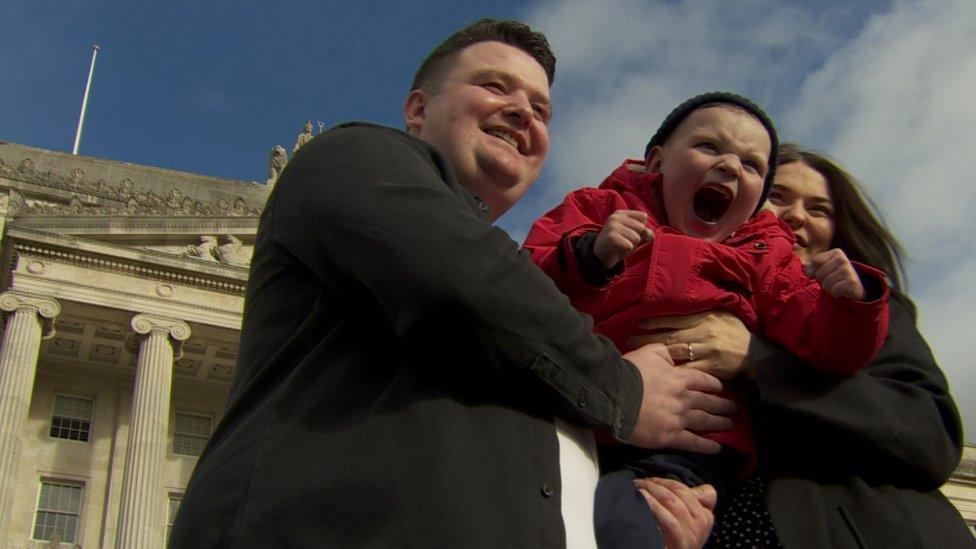Organ donation: Dad devastated over opt-out donation law delay
- Published
Máirtín MacGabhann says the delay in introducing an organ donation law named after his son Dáithí is not acceptable
The father of a boy waiting for a heart transplant said he is devastated that an opt-out organ donation system will be delayed from taking effect due to Stormont's stalemate.
Máirtín MacGabhann told BBC News NI the delay is unacceptable.
The new law automatically makes people organ donors unless they specifically state otherwise.
It is named Dáithí's Law, after Máirtín's six-year-old son who is on the organ transplant waiting list.
It was due to come into force this spring but cannot go forward without a functioning government.
Northern Ireland is the only part of the UK where an opt-out system is not yet in place.
The family of Dáithí had long campaigned for a change in the law.
Mr MacGabhann said the family would be writing to the Northern Ireland Secretary Chris Heaton-Harris in the hope it might be in his power to bring it forward.
"To wake up this AM to hear that it won't go live in spring 2023 as planned is devastating and unacceptable," he told BBC Radio Ulster's Good Morning Ulster programme.
Legislation waiting but frozen
The delay in enacting the law relates to extra legislation, which must be passed by Stormont.
In a communication seen by BBC News NI, the Department of Health said that "secondary legislation is required to clarify which organs and tissues are covered" under the opt-out system.
It states that legislation has been "prepared and is ready to be introduced" in the assembly, but the ongoing political deadlock means that cannot happen yet.
Stormont has been without a functioning government for 11 months as the Democratic Unionist Party (DUP) is blocking the formation over its opposition to the Northern Ireland Protocol.
Secondary legislation is commonly used to fill in the gaps of new laws to enable them to be enforced and, if needed, updated over time.
The Organ and Tissue Donation (Deemed Consent) Bill was approved by assembly members (MLAs) at Stormont last February.
There was then a built-in 12-month implementation period including the recruitment of staff, training and education with the system expected to kick in from spring 2023, following the passing of the secondary legislation.
'Life saving'
The Department of Health said contingency plans have been activated that would allow its implementation planning to "remain in a state of readiness pending the restoration of the assembly".
It added that, until then, public awareness campaigns will continue to promote the forthcoming law change.
But the department said: "It is not possible in the absence of the assembly to confirm a 'go-live' date for Dáithí's Law."

The bill is called Dáithí's law after six-year-old Dáithí MacGabhann, who is waiting for a heart transplant
Mr MacGabhann told BBC News NI it was particularly frustrating because a lot of work had gone into getting the legislation to where it is now.
"Everything that needs to happen is just a formality - the hard work has been done."
"This is life-saving legislation," he said, adding that it was devastating to see families waiting for an organ.
"It does not bother me if it's going to take someone in Westminster to push this forward."
He added: "I asked Dáithí last night: 'When do we need Dáithí's Law?" and he shouted at the top of his voice: 'Now!'"
'Matter of urgency'
DUP MP for East Londonderry Gregory Campbell said he believed the law can be changed at Westminster.
"If Stormont wasn't there full stop, Westminster would have to act," he told BBC Radio Foyle's Breakfast Show.
He said that he and others would be raising it in Westminster to get action as a "matter of urgency".
However, Sinn Féin deputy leader Michelle O'Neill said the blocking of the law "because one party has refused to enter the assembly" is unacceptable.
Allow X content?
This article contains content provided by X. We ask for your permission before anything is loaded, as they may be using cookies and other technologies. You may want to read X’s cookie policy, external and privacy policy, external before accepting. To view this content choose ‘accept and continue’.

Alliance assembly member Paula Bradshaw said she has written to Mr Heaton-Harris asking him to use powers, in the absence of a minister, to enable the department to enact the system.
The head of British Heart Foundation in Northern Ireland, Fearghal McKinney, said he wanted to see the legislation in place as soon as possible.
"We encourage everyone eligible to register as an organ donor and to have the conversation with their families and loves to share their wishes so they can give the gift of life to others," he added.
The Northern Ireland Office has urged the political parties to form an executive to resolve issues within the health service.
A spokesperson said: "The absence of a Northern Ireland Assembly is causing unnecessary delays in the introduction of this life-saving legislation and the secretary of state urges the Northern Ireland parties to come back to the executive, get back to work and take these decisions in the interests of the people of Northern Ireland."
Related topics
- Published8 February 2022
